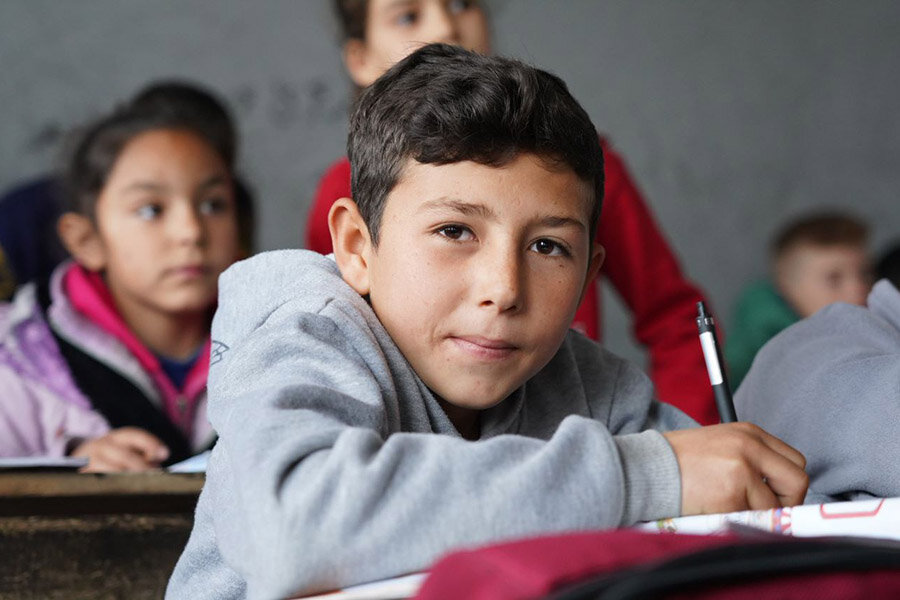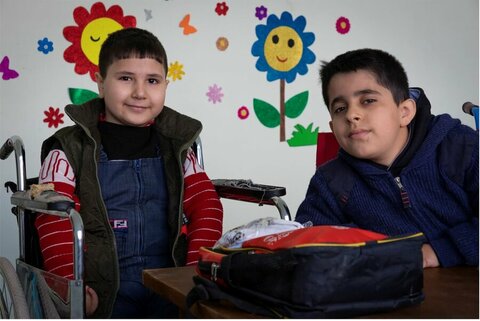Education in Syria: WFP cash grants ignite one boy’s ambition to study

On a rainy winter’s day, 12-year-old Issa walks to school in Hama, Syria in a pair of old sneakers and a thin cotton sweater. This is all he has to fend off the weather, but even on the coldest days, nothing can keep him home from school.
Today, Issa has already been awake since before dawn. He had to queue at a local bakery to collect fresh bread for his family. When he came back home soaked with rainwater, he spent about 30 minutes trying to start the stove with plastic sheets and firewood. He collects these materials in arduous scavenger treks with his father to bring some warmth for his three younger siblings.
‘Seeing other children going to school when I couldn’t made me feel bitter’
“He is such a caring person,” says Khalil, Issa’s father, “Despite his young age, he takes on many responsibilities to help us.”
Today at school Issa’s studying sport and Arabic – his favourite subjects. “I dream of becoming a lawyer,” he says. “Studying, being with my classmates and interacting with the teachers makes me very happy.”
Issa loves school but accessing the classroom has been a huge challenge. Born in rural Raqqa just one year before conflict broke out across the country 11 years ago, Issa’s childhood was nothing like his parents imagined. As Issa grew, Syria changed too. His home became one of the most dangerous places in the country for a family with small children. When he was just 5-years-old, his parents made an impossible decision. It was time to go.

Issa had just started school and it would be three years before he would sit inside a classroom again. While they were displaced, the family’s house and belongings were destroyed. For Issa, being away from school was one of the most challenging parts.
“For long days and nights, I did nothing of value. Seeing other children going to school when I couldn’t made me feel bitter,” says Issa. “I would ask my parents to enroll me in school and they would say that we needed to settle down first, because we were still moving from one place to another.”
Syria’s prolonged conflict and deteriorating economy mean that many displaced students have never returned to class. Education is an expense that is beyond the reach of families who consumed their savings during years on the move. Although schools in Syria are free, the cost of transport can prohibit children from attending class.
‘What I earn can barely cover our food, our bills and the petrol I need to go to work’
For Syria’s youth, the consequences have been devastating. Children who had dreams of becoming teachers and engineers now stay at home, or worse, have gone in search of work to help their families to survive. It’s unlikely they will return to school again as the cost of living across Syria reaches unprecedented highs.
Finding safety, school and a new start
In 2019, Issa’s finally found safety in a single-room apartment in a quiet village in rural Hama governorate. Issa was thrilled to go back to school, but that also meant an extra financial burden on the already exhausted family.
Issa’s father, Khalil, found work as a labourer at a brick factory. To make ends meet, he sometimes has to go into debt to buy the basics. “I can’t buy the children whatever they need for clothing or school, because what I earn can barely cover our food, our bills and the petrol I need to go to work,” says Khalil, “We deprive ourselves of many things to keep the children in school.”
While Issa’s parents struggled to rebuild their lives and give their children a sense of routine, including by sending them to school, the family found out they would receive an electronic voucher from the World Food Programme. The voucher is topped up with cash each month so families can buy nutritious food and hygiene items at stores close to their homes.
This is part of WFP’s Out of School Children (OOSC) project that aims to help vulnerable families to meet their food and nutritional needs. The voucher is given to the families of students who missed out on school due to the conflict and who are currently attending an accelerated learning programme called Curriculum B that helps them to make up for the years of study they missed.

The voucher is an incentive for families to continue to send their children to class as it lifts some of their financial pressures.
As soon as Issa’s family received the card, some of the family’s financial burden began to ease.
“We were extremely happy to receive the voucher and it’s been much needed support to our nutrition needs,” said Issa’s mother Hanan as she serves a snack to Issa while he revises his lessons. “Whatever this voucher saves of my earnings goes towards other necessities such as school stationery and hygiene products,” adds Khalil.
“We are using it to get what we need, such as ghee, cooking oil, rice and other things. When cash is added to the voucher, we get what’s needed for the household.”
'I want to be an engineer'

After years of uncertainty, the family are looking toward the future with hope.
Issa is now in the third grade and one of the top students in his class. “My favorite moments are when I do something well and my teachers and classmates applaud me,” he says.
“Since our children returned to school and restored their education… my husband and I have restored our peace of mind,” says his mother Hanan. “They went through so much suffering back when schools were shut. Educating the children is important to me.”
For Hanan, this is also a chance to give her children opportunities that she never had. “I can’t read or write because I missed out on schooling, I want them to focus on their education and make it their top priority.”
Each month over 32,000 households of children at risk of dropping out from school benefitted from WFP’s cash transfers in Syria. The voucher protects children from negative coping mechanism such as child labor, and provides a safety net to families as it lifts part of the financial pressure.


